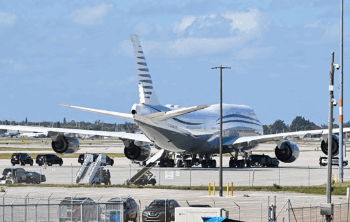A South African court on Friday found a woman guilty of trafficking her six-year-old daughter, who has been unaccounted for for over a year, in a case that has deeply disturbed the country.
Throughout the two-month-long proceedings, multiple witnesses testified that Racquel “Kelly” Smith admitted to selling her daughter Joshlin in February 2024, with some alleging she received 20,000 rand ($1,085).

Judge Nathan Erasmus stated that the testimonies of 35 prosecution witnesses led to the conclusion that Smith, aged 35, along with her boyfriend and a mutual friend, were guilty of human trafficking and kidnapping.
“I have already found that on the evidence before me, Joshlin was exchanged,” he said.
“The evidence is from all scores there were payments, or at least the promise of payments,” he said, accusing Smith of viewing her six-year-old daughter as a “commodity”.
The trial took place inside a community hall located in Saldanha Bay, a small fishing town roughly 135 kilometres (80 miles) from Cape Town, where the case stirred strong emotions.
Crowds routinely gathered outside the venue, shouting, “We want Joshlin back” — and the announcement of the verdict was met with loud applause.
Local residents had actively participated alongside authorities in extensive efforts to locate the missing girl in their struggling neighborhood.
“You are guilty of… trafficking in persons in relation to Joshlin Smith. On count two, you are also convicted of kidnapping,” Erasmus declared to the three accused, none of whom provided testimony during the trial.
The judge postponed proceedings to allow for sentencing, which could result in life imprisonment.
Smith had initially been met with public sympathy following reports of her daughter’s disappearance.
Images highlighting Joshlin’s vivid green eyes, radiant smile, and signature brown pigtails circulated widely across media platforms.
The case attracted widespread national focus, including from Sports Minister Gayton McKenzie, who pledged a one-million-rand (\$54,000) reward for Joshlin’s safe recovery.
However, developments shifted when prosecutors argued that Smith had sold her daughter to a traditional healer, allegedly drawn to the child’s eyes and light skin tone.
During the trial, it emerged that Smith, who is also a mother to two other children, remained oddly composed and detached amid the desperate search efforts.
Shocking revelations included testimonies from the girl’s schoolteacher and a pastor, both claiming the mother had confessed to intentions of selling her daughter as early as 2023.
What you should know
South Africa has one of the most comprehensive anti-human trafficking laws in Africa, with the Prevention and Combating of Trafficking in Persons Act (Act 7 of 2013) serving as the primary legislation.
This law criminalizes all forms of trafficking and carries especially severe penalties when the victim is a child.
In cases involving children, such as the trafficking and kidnapping of Joshlin Smith, offenders face a mandatory life sentence or a fine that can reach up to R100 million, or both.
The Act defines trafficking broadly, covering recruitment, transport, transfer, harbouring, or receipt of persons using threat, force, coercion, abduction, fraud, or abuse of power for purposes of exploitation.
In the case of Joshlin, the court accepted evidence that her mother and accomplices sold her for financial gain, treating her as a commodity.
This constitutes a clear violation of her rights as enshrined in both South African law and international treaties to which South Africa is a signatory, including the UN Convention on the Rights of the Child.
The guilty verdict sends a strong message that crimes against children will not be tolerated and will be met with the full force of the law, including possible life imprisonment.
ALSO READ TOP STORIES FROM VERILY NEWS


















